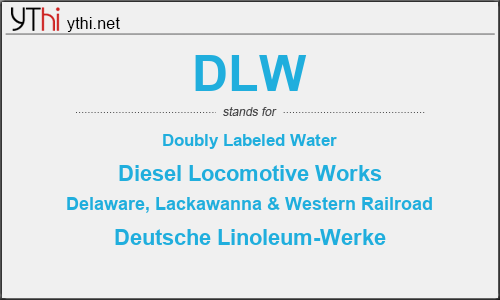What does DLW mean? What is the full form of DLW?
1, The full form of DLW is Doubly Labeled Water. It’s used on Medical ,Tests in Worldwide
Doubly labeled water is water in which both the hydrogen and the oxygen have been partly or completely replaced (i.e. labeled) with an uncommon isotope of these elements for tracing purposes.
The doubly labeled water (DLW) technique was developed as a method for measurement of free-living energy expenditure in animals (Lifson and McClintock, 1966). The method has since been validated in many animal species (for summary see Roberts, 1989; Schoeller, 1988). Twenty years after the initial report of the DLW method (Lifson et al., 1955), the economic feasibility of using the method in humans was considered (Lifson et al., 1975). The obstacle to applying the method to humans was the cost of the large quantities of oxygen-18 labeled water (H2 18O) needed to attain an adequate isotopic enrichment for calculation of valid elimination rates. This obstacle was overcome by improvements in gas isotope ratio mass spectrometers and a decrease in the cost of H2 18O. Another 7 years passed before the DLW method eventually was validated against the intake balance (I/B) method in humans (Schoeller and van Santen, 1982). The method has since been validated against indirect calorimetry and I/B in many different subject populations by several laboratories, with a demonstrated precision (coefficient of variation) of 2 to 8 percent (Schoeller, 1988).
Scientists have been measuring energy expenditure by using gas exchange for the past 200 y. This technique is based on earlier work in the 1660s. Gas exchange in respirometers provides accurate and repeatable measures of resting metabolic rate. However, it is impossible to duplicate in a respirometry chamber the diversity of human behaviors that influence energy expenditure. The doubly labeled water technique is an isotope-based method that measures the energy expenditure of unencumbered subjects from the divergence in enrichments of 2 isotopic labels in body water–1 of hydrogen and 1 of oxygen. The method was invented in the 1950s and applied to small animals only until the early 1980s, mostly because of the expense. Since 1982, when the first study in humans was published, its use has expanded enormously. Although there is some debate over the precise calculation protocols that should be used, the differences between alternative calculations result in relatively minor effects on total energy expenditure estimates (approximately 6%). Validation studies show that for groups of subjects the method works well, but that precision is still relatively poor (8-9%) and consequently the method is not yet sufficiently refined to provide estimates of individual energy expenditures.
2, The full form of DLW is Diesel Locomotive Works. It’s used on Governmental ,Firms & Organizations in India
Diesel Locomotive Works (DLW) is a manufacturing unit owned by Indian Railways, that manufactures diesel-electric locomotives and its spare parts, located in Varanasi, India.
The Diesel Locomotive Works (DLW), a premier locomotive manufacturing unit of Indian Railways in Varanasi, will now be known as Banaras Locomotive Works (BLW), as a gazette notification in this regard was made on Wednesday. The notification of the Ministry of Railways dated October 27 says that the Central government has decided to change the name of ‘Diesel Locomotive Works’, Varanasi to ‘Banaras Locomotive Works’. The change will come into force with immediate effect.
However, the DLW authorities are yet to receive the official intimation in this regard. According to them, it will take some time to change the name in the records and signages. “We are waiting for the official order,” said DLW spokesperson Ashok Kumar.
3, The full form of DLW is Delaware, Lackawanna & Western Railroad. It’s used on Transport & Travel ,Rail Transport in United States
The Delaware, Lackawanna & Western Railroad (also known as the DL&W or Lackawanna Railroad) was a U.S. Class 1 railroad that connected Buffalo, New York, and Hoboken, New Jersey (and by ferry with New York City), a distance of about 400 miles (640 km). Incorporated in 1853, the DL&W was profitable during the first two decades of the twentieth century, but its margins were gradually hurt by declining traffic in coal and competition from trucks. In 1960, the DL&W merged with rival Erie Railroad to form the Erie Lackawanna Railroad.
The Delaware, Lackawanna and Western Railroad (better known as the Lackawanna and not to be confused with current short line, Delaware-Lackawanna) was another of the Northeast’s many anthracite carriers with a history tracing back to the early 19th century.
During the company’s height it never reached 1,000 miles in size but was nevertheless a well-managed company throughout its corporate history. As a result, it avoided bankruptcy from the time of its formation (early 1850s) until its merger with the Erie more than a century later.
It has been argued that had Lackawanna’s top officers been allowed to oversee the new Erie Lackawanna (1960), it would have been a much more successful operation.
4, The full form of DLW is Deutsche Linoleum-Werke. It’s used on Business ,Companies & Corporations in Germany
German Linoleum Works (German: Deutsche Linoleum-Werke, DLW) is a linoleum (material used to manufacture elastic floor coverings) factory in Germany.
DLW
means
Doubly Labeled Water![]()
Translate Doubly Labeled Water to other language.
Diesel Locomotive Works![]()
Translate Diesel Locomotive Works to other language.
Delaware, Lackawanna & Western Railroad![]()
Translate Delaware, Lackawanna & Western Railroad to other language.
Deutsche Linoleum-Werke![]()
Translate Deutsche Linoleum-Werke to other language.


Leave a Reply
You must be logged in to post a comment.